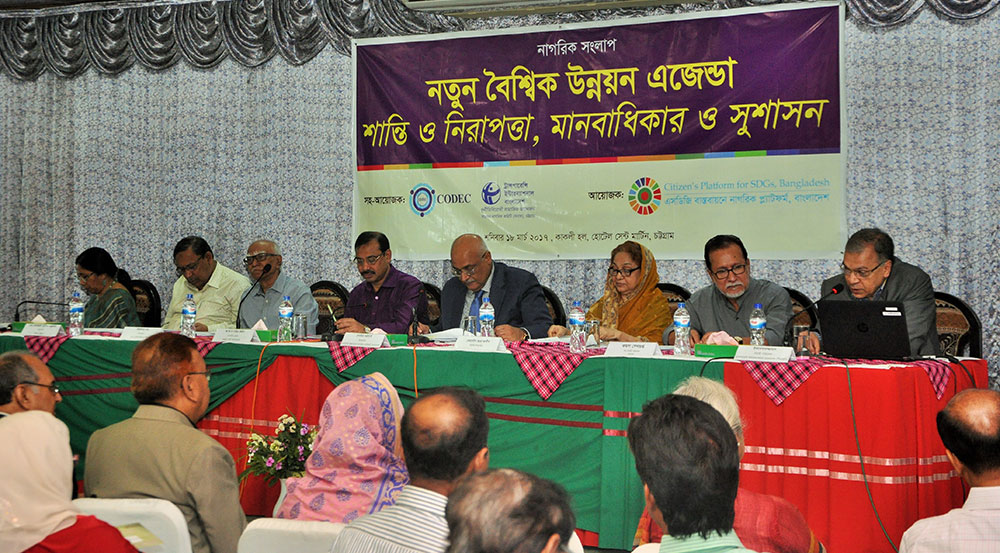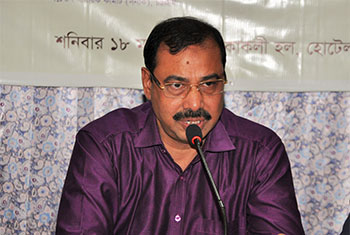
Importance of good governance is known to all, but we also need to aware ourselves on the roles that we can play as active citizens, says Mr A J M Nasiruddin, Honourable Mayor of Chittagong City Corporation at a Dialogue on “The New Global Development Agenda: Peace and Security, Human Rights and Governance,” organised by Citizen’s Platform for SDGs, Bangladesh, on 18 March 2017 at Hotel Saint Martin, Chittagong. He urged people to have a change in their mind set about bureaucrats. Rather than pointing out the negatives, he emphasised, we need to work cohesively for building safe and inclusive cities.
 The event was chaired by Dr Debapriya Bhattacharya; Convenor of the Platform and Distinguished Fellow, CPD. Professor Sekandar Khan, Vice Chancellor, East Delta University, Chittagong, and Professor Ferdous Ara Alim, Eminent Academician, joined as the Special Guests. With a focus on the SDGs (Goal 16: Promote peaceful and inclusive societies for sustainable development, provide access to justice for all and build effective, accountable and inclusive institutions at all levels), the Dialogue was targeted to increase citizen’s awareness, strengthen local administrative capacities for grassroots implementation, and make political will visible by incorporating people’s perceptions in the Development Agenda.
The event was chaired by Dr Debapriya Bhattacharya; Convenor of the Platform and Distinguished Fellow, CPD. Professor Sekandar Khan, Vice Chancellor, East Delta University, Chittagong, and Professor Ferdous Ara Alim, Eminent Academician, joined as the Special Guests. With a focus on the SDGs (Goal 16: Promote peaceful and inclusive societies for sustainable development, provide access to justice for all and build effective, accountable and inclusive institutions at all levels), the Dialogue was targeted to increase citizen’s awareness, strengthen local administrative capacities for grassroots implementation, and make political will visible by incorporating people’s perceptions in the Development Agenda.
Discussions highlighted how the SDGs look upon the development challenges for the country and the segment of the population who are most deprived and need utmost support at the policy and institutional level. Skepticism floats on how meaningfully SDGs can be implemented with a political divisiveness in resource allocation. This is especially true when there is lack of technical capacity and coordination amongst different tiers of the civil technocrats.
Professor Sekandar Khan expressed his views on other parts of the world where development plans are made in consultation with sector advisors, creating a consensus between what-is-needed and what-is-planned for achieving the development targets. Bangladesh lagged to create synergy between technical guidance by town planners and resource allocation by public institutions, which has been very non-inclusive in nature. He said, bureaucrats need to be more sensitive towards people’s consensus, for governance and accountability to be in action.
However, the nature of the Goals being inclusive, SDGs require presence of all marginalised groups in the development landscape through rights-based approach technique of advocacy, said Professor Ferdous Ara Alim. Discussion followed on how city planning needs to be safer for women who commute alone at night, and how to be thoughtful while designing toilets and elevators in our private apartment buildings making them accessible to the people with special needs. Traditional text books in the public schools should cover specialised information on civic and social knowledge. When text books will consider discouraging early childhood marriage i.e. not under the age of 18 years, then children will face less violence or social stigma. Discussants openly voiced against the recent change in law of minimum age of Girl Child Marriage which in-effect violates fundamental rights in education for all children.
As Agenda 2030 inspires citizens to engage and enhance participation in the delivery, Dr Debapriya Bhattarcharya said, in the sudden rise of militancy, Bangladesh has to mobilise broader public vigilance, not only to improve accountability in the delivery of the SDG outputs, but also to counter terrorism.

